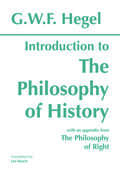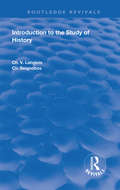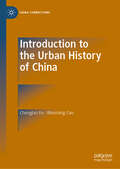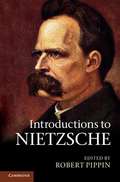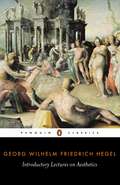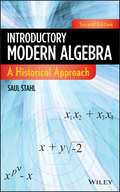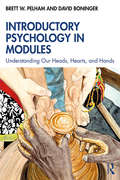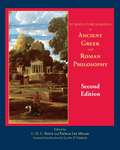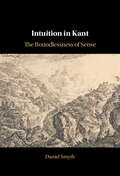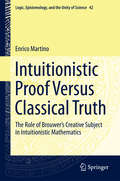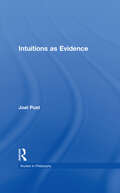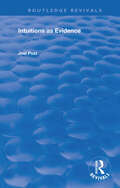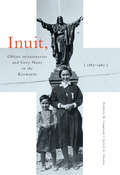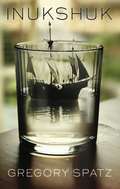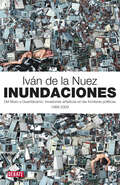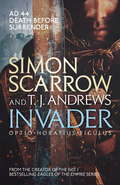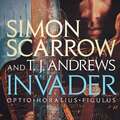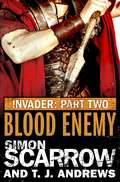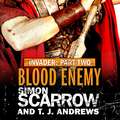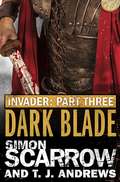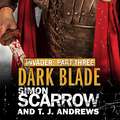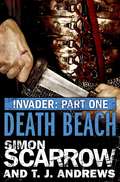- Table View
- List View
Introduction to the Philosophy of History: with selections from The Philosophy of Right
by Georg Wilhelm Friedrich Hegel Leo Rauch. . . eminently readable . . . admirably picks up the spirit of what Hegel is saying. . . . more readable and accurate than Hartmann's, and it translates a more readable text than does Nisbet's. It includes (as Hartmann's does not) an excerpt, which serves as chapter five, from 'The Geographical Basis of History' (particularly interesting for what it says of America), and a brief chapter six, entitled 'The Division of History.' The volume closes with an appendix, translating §§341-360 of Hegel's Philosophy of Right and deals directly with the very concept of 'World History.' It constitutes a big help in coming to grips with what Hegel means by 'Spirit.' --Quentin Lauer, SJ, Fordham University, in International Philosophical Quarterly
Introduction to the Study of History (Routledge Revivals)
by CH. V. Langlois CH. SeignobosOriginally translated and published in 1906, this volume is a full translation of Langlois and Seignobos' Introduction to the Study of History and contains chapters on the search for documents, textual criticism, critical investigation of authorship, and interpretative criticism.
Introduction to the Urban History of China (China Connections)
by Chonglan Fu Wenming CaoThis book explores China’s urban development, examining the history and culture of Chinese cities and providing a cultural background to the rapid urban development of contemporary China. It offers a new perspective on Chinese urban history, showcasing the traditional culture which underpins the emergence of the modern city and highlighting how traditional Chinese philosophical thought is reflected in the culture of urban planning and architecture in China, notably examining such issues as ‘the integration of man and nature’, yin and yang, bagua, and the Wu Xing.
Introductions to Nietzsche
by Robert B. PippinFriedrich Nietzsche (1844–1900) is one of the most important philosophers of the last two hundred years, whose writings, both published and unpublished, have had a formative influence on virtually all aspects of modern culture. This volume offers introductory essays on all of Nietzsche's completed works and also his unpublished notebooks. The essays address such topics as his criticism of morality and Christianity, his doctrines of the will to power and the eternal recurrence, his perspectivism, his theories of tragedy and nihilism and his thoughts on ancient and modern culture. Written by internationally recognized scholars, they provide the interested reader with an up-to-date and authoritative overview of the thought of this fascinating figure.
Introductory Lectures on Aesthetics
by Georg HegelNo philosopher has held a higher opinion of art than Hegel, yet nor was any so profoundly pessimistic about its prospects - despite living in the German golden age of Goethe, Mozart and Schiller. For if the artists of classical Greece could find the perfect fusion of content and form, modernity faced complicating - and ultimately disabling - questions. Christianity, with its code of unworldliness, had compromised the immediacy of man's relationship with reality, and ironic detachment had alienated him from his deepest feelings. Hegel's Introductory Lectures on Aesthetics were delivered in Berlin in the 1820s and stand today as a passionately argued work that challenged the ability of art to respond to the modern world.
Introductory Modern Algebra
by Saul StahlPraise for the First Edition"Stahl offers the solvability of equations from the historical point of view...one of the best books available to support a one-semester introduction to abstract algebra."--CHOICEIntroductory Modern Algebra: A Historical Approach, Second Edition presents the evolution of algebra and provides readers with the opportunity to view modern algebra as a consistent movement from concrete problems to abstract principles. With a few pertinent excerpts from the writings of some of the greatest mathematicians, the Second Edition uniquely facilitates the understanding of pivotal algebraic ideas.The author provides a clear, precise, and accessible introduction to modern algebra and also helps to develop a more immediate and well-grounded understanding of how equations lead to permutation groups and what those groups can inform us about such diverse items as multivariate functions and the 15-puzzle. Featuring new sections on topics such as group homomorphisms, the RSA algorithm, complex conjugation, the factorization of real polynomials, and the fundamental theorem of algebra, the Second Edition also includes:An in-depth explanation of the principles and practices of modern algebra in terms of the historical development from the Renaissance solution of the cubic equation to Dedekind's idealsHistorical discussions integrated with the development of modern and abstract algebra in addition to many new explicit statements of theorems, definitions, and terminologyA new appendix on logic and proofs, sets, functions, and equivalence relationsOver 1,000 new examples and multi-level exercises at the end of each section and chapter as well as updated chapter summariesIntroductory Modern Algebra: A Historical Approach, Second Edition is an excellent textbook for upper-undergraduate courses in modern and abstract algebra.
Introductory Psychology in Modules: Understanding Our Heads, Hearts, and Hands
by Brett Pelham David BoningerIntroductory Psychology in Modules: Understanding Our Heads, Hearts, and Hands is a unique and comprehensive introduction to psychology. It consists of 36 short modules that keep students engaged with humor, a narrative style, and hands-on activities that facilitate interactive learning and critical thinking. Each stand-alone module focuses on a major topic in psychology, from the brain, sensation, memory, and cognition to human development, personality, social psychology, and clinical psychology. The modular format also allows a deep dive into important topics that have less coverage in other introductory psychology textbooks. This includes cross-cultural psychology, stereotypes and discrimination, evolutionary psychology, sex and gender, climate change, health psychology, and sport psychology. This truly modular format – ideal for both face to face and virtual learning – makes it easy for instructors to customize their readings and assign exactly what they wish to emphasize. The book also contains an abundance of pedagogical features, including numerous hands-on activities and/or group discussion activities, multiple-choice practice quizzes, and an instructor exam bank written by the authors. By covering both classic and contemporary topics, this book will delight students and instructors alike. The modular format also makes this a useful supplementary text for classes in nursing, medicine, social work, policing, and sociology.
Introductory Readings in Ancient Greek and Roman Philosophy
by Lloyd P. Gerson C. D. Reeve Patrick Lee MillerA concise anthology for the ancient philosophy survey that ranges from the Presocratics through the Neoplatonists, Introductory Readings in Ancient Greek and Roman Philosophy features essential selections from C.D.C. Reeve's 2004 translation of Plato's Republic, which casts reported speech into direct dialogue, as well other translations known for their accuracy and accessibility. Introductions and notes are also included.
Intuition in Kant: The Boundlessness of Sense
by Daniel SmythIn this book Daniel Smyth offers a comprehensive overview of Immanuel Kant's conception of intuition in all its species – divine, receptive, sensible, and human. Kant considers sense perception a paradigm of intuition, yet claims that we can represent infinities in intuition, despite the finitude of sense perception. Smyth examines this heterodox combination of commitments and argues that the various features Kant ascribes to intuition are meant to remedy specific cognitive shortcomings that arise from the discursivity of our intellect Intuition acting as the intellect's cognitive partner to make knowledge possible. He reconstructs Kant's conception of intuition and its role in his philosophy of mind, epistemology, and philosophy of mathematics, and shows that Kant's conception of sensibility is as innovative and revolutionary as his much-debated theory of the understanding.
Intuitionistic Proof Versus Classical Truth: The Role Of Brouwer's Creative Subject In Intuitionistic Mathematics (Logic, Epistemology, and the Unity of Science #42)
by Enrico MartinoThis book examines the role of acts of choice in classical and intuitionistic mathematics. Featuring fifteen papers – both new and previously published – it offers a fresh analysis of concepts developed by the mathematician and philosopher L.E.J. Brouwer, the founder of intuitionism.The author explores Brouwer’s idealization of the creative subject as the basis for intuitionistic truth, and in the process he also discusses an important, related question: to what extent does the intuitionistic perspective succeed in avoiding the classical realistic notion of truth? The papers detail realistic aspects in the idealization of the creative subject and investigate the hidden role of choice even in classical logic and mathematics, covering such topics as bar theorem, type theory, inductive evidence, Beth models, fallible models, and more. In addition, the author offers a critical analysis of the response of key mathematicians and philosophers to Brouwer’s work. These figures include Michael Dummett, Saul Kripke, Per Martin-Löf, and Arend Heyting.This book appeals to researchers and graduate students with an interest in philosophy of mathematics, linguistics, and mathematics.
Intuitions as Evidence
by Joel PustFirst published in 2000. Routledge is an imprint of Taylor & Francis, an informa company.
Intuitions as Evidence (Studies In Philosophy Ser.)
by Joel PustFirst published in 2000. Starting with Kripke's quotation on intuitive content being philosophic evidence, in this essay, the author aims to demonstrate how contemporary philosophy relies on intuitions as evidence, to explain what intuitions are and show why certain contemporary arguments against the use of intuitions as evidence fail.
Inuit, Oblate Missionaries, and Grey Nuns in the Keewatin, 1865-1965
by Jarich G. Oosten Frédéric B. LaugrandOver the century between the first Oblate mission to the Canadian central Arctic in 1867 and the radical shifts brought about by Vatican II, the region was the site of complex interactions between Inuit, Oblate missionaries, and Grey Nuns – interactions that have not yet received the attention they deserve. Enriching archival sources with oral testimony, Frédéric Laugrand and Jarich Oosten provide an in-depth analysis of conversion, medical care, education, and vocation in the Keewatin region of the Northwest Territories. They show that while Christianity was adopted by the Inuit and major transformations occurred, the Oblates and the Grey Nuns did not eradicate the old traditions or assimilate the Inuit, who were caught up in a process they could not yet fully understand. The study begins with the first contact Inuit had with Christianity in the Keewatin region and ends in the mid-1960s, when an Inuk woman joined the Grey Nuns and two Inuit brothers became Oblate missionaries. Bringing together many different voices, perspectives, and experiences, and emphasizing the value of multivocality in understanding this complex period of Inuit history, Inuit, Oblate Missionaries, and Grey Nuns in the Keewatin, 1865–1965 highlights the subtle nuances of a long and complex interaction, showing how salvation and suffering were intertwined.
Inuit, Oblate Missionaries, and Grey Nuns in the Keewatin, 1865-1965
by Jarich G. Oosten Frédéric B. LaugrandOver the century between the first Oblate mission to the Canadian central Arctic in 1867 and the radical shifts brought about by Vatican II, the region was the site of complex interactions between Inuit, Oblate missionaries, and Grey Nuns – interactions that have not yet received the attention they deserve. Enriching archival sources with oral testimony, Frédéric Laugrand and Jarich Oosten provide an in-depth analysis of conversion, medical care, education, and vocation in the Keewatin region of the Northwest Territories. They show that while Christianity was adopted by the Inuit and major transformations occurred, the Oblates and the Grey Nuns did not eradicate the old traditions or assimilate the Inuit, who were caught up in a process they could not yet fully understand. The study begins with the first contact Inuit had with Christianity in the Keewatin region and ends in the mid-1960s, when an Inuk woman joined the Grey Nuns and two Inuit brothers became Oblate missionaries. Bringing together many different voices, perspectives, and experiences, and emphasizing the value of multivocality in understanding this complex period of Inuit history, Inuit, Oblate Missionaries, and Grey Nuns in the Keewatin, 1865–1965 highlights the subtle nuances of a long and complex interaction, showing how salvation and suffering were intertwined.
Inukshuk
by Gregory Spatz"An elaborate tale of family and the paths people take to understanding." -Seattle Times"[This] mix of well-researched history and contemporary fiction makes for a fine, sad read." -Minneapolis Star Tribune"Hauntingly honest and emotionally resonant." -Publishers Weekly (starred review)"Gregory Spatz's prose is as clean and sparkling as a new fall of snow." -JANET FITCH, author of White Oleander and Paint it Black"At its heart Inukshuk is about family. But Spatz has transfigured this beautifully told, wise story with history and myth, poetry and magic into something rarer, stranger and altogether amazing. A book that points unerringly true north." -KAREN JOY FOWLER, author of The Jane Austen Book Club and Wit's EndJohn Franklin has moved his fifteen-year-old son to the remote northern Canadian town of Houndstitch to make a new life together after his wife, Thomas' mother, left them. Mourning her disappearance, John, a high school English teacher, writes poetry and escapes into an affair, while Thomas withdraws into a fantasy recreation of the infamous Victorian-era arctic expedition led by British explorer Sir John Franklin. With teenage bravado, Thomas gives himself scurvy so that he can sympathize with the characters in the film of his mind-and is almost lost himself.While told over the course of only a few days, this gripping tale slips through time, powerfully evoking a modern family in distress and the legendary "Franklin's Lost Expedition" crew's descent into despair, madness, and cannibalism aboard the HMS Erebus and HMS Terror on the Arctic tundra.Gregory Spatz is the author of the novels Inukshuk, Fiddler's Dream, and No One But Us, and the short fiction collections Wonderful Tricks and Half as Happy. A graduate of the Iowa Writers' Workshop and recipient of a Washington State Book Award, he teaches at Eastern Washington University in Spokane and plays the fiddle and tours with Mighty Squirrel and the internationally acclaimed bluegrass band John Reischman and The Jaybirds.
Inundaciones: Del Muro a Guantánamo: invasiones artísticas en las fronteras políticas
by Iván de NuezUn repaso a los grandes temas del arte contemporáneo desde 1989. Veinte años de transformaciones políticas. Veinte años de arte contemporáneo. Solo veinte años van de la caída del muro al desmantelamiento de la prisión de Guantánamo. Del fin de la Guerra Fría a la confirmación de la impotencia estadounidense para controlar el mundo que surgió del colapso comunista. A modo de dietario, con un capítulo por cada uno de los 21 años transcurridos, Iván de la Nuez recorre, con su brillantez habitual, todos los recovecos de nuestra experiencia para iluminar el impacto del arte en la historia contemporánea, y de la historia contemporánea en el arte. Un ensayo que demuestra la irremediable unión que existe entre arte, política y sociedad
Invader
by Simon Scarrow T. J. AndrewsINVADER is a Sunday Times bestseller from Simon Scarrow (author of the bestsellers BRITANNIA and CENTURION) and T. J. Andrews, co-author of the bestselling INVADER. Featuring the Roman army officer Figulus in first-century Britannia, INVADER is not to be missed by readers of Conn Iggulden and Bernard Cornwell.Roman Britain, AD 44. The land is far from tamed. A puppet king is doing little to calm the hatred of the native tribes.Fighting is in Optio Horatius Figulus' blood. His Celtic ancestry gives him the toughness essential for survival. That toughness will be tested to the very limit when he is sent on a mission deep in hostile territory. And Figulus knows that, even utterly crushed in battle, their warriors routed and the Druids driven from their hill forts, the tribesmen of Britannia will sooner die than surrender.Figulus fought alongside Macro and Cato in Simon Scarrow's bestselling Eagles of the Empire series. In INVADER, he stands alone.INVADER has previously been published in five separate ebook novellas.
Invader
by Simon Scarrow T. J. AndrewsINVADER is a Sunday Times bestseller from Simon Scarrow (author of the bestsellers BRITANNIA and CENTURION) and T. J. Andrews, co-author of the bestselling INVADER. Featuring the Roman army officer Figulus in first-century Britannia, INVADER is not to be missed by readers of Conn Iggulden and Bernard Cornwell.Roman Britain, AD 44. The land is far from tamed. A puppet king is doing little to calm the hatred of the native tribes.Fighting is in Optio Horatius Figulus' blood. His Celtic ancestry gives him the toughness essential for survival. That toughness will be tested to the very limit when he is sent on a mission deep in hostile territory. And Figulus knows that, even utterly crushed in battle, their warriors routed and the Druids driven from their hill forts, the tribesmen of Britannia will sooner die than surrender.Figulus fought alongside Macro and Cato in Simon Scarrow's bestselling Eagles of the Empire series. In INVADER, he stands alone.INVADER has previously been published in five separate ebook novellas.
Invader
by Simon Scarrow T. J. AndrewsFrom the author of the Sunday Times bestsellers BRITANNIA, CENTURION and THE GLADIATOR, and co-author with T. J. Andrews of the Sunday Times bestseller ARENA, comes a tense, action-packed adventure with the Roman army officer Figulus in the heart of barbaric first-century Britannia. Roman Britain, AD 44. The land is far from tamed. A puppet king is doing little to calm the hatred of the native tribes and bring them under Roman rule.Fighting is in Optio Horatius Figulus' blood. His Celtic ancestry is mocked by his fellow soldiers, but it gives him the toughness essential for survival. That toughness will be tested to the very limit when he is sent on a mission deep in hostile territory.And Figulus understands the Celtic mind. He knows that, even utterly crushed in battle, their warriors routed and the Druids driven from their hill forts, the tribesmen of Britannia will sooner die than surrender.Figulus fought alongside Macro and Cato in Simon Scarrow's bestselling Eagles of the Empire series. In INVADER, he stands alone.INVADER has previously been published in five separate ebook novellas. This print edition brings the complete series together in one volume.
Invader: Blood Enemy (2 in the Invader Novella Series)
by Simon Scarrow T. J. AndrewsThe second novella in the gripping INVADER series, set in Roman Britain, AD 44, from Sunday Times bestselling authors Simon Scarrow and T. J. AndrewsBritannia is a nightmare campaign setting for the brave soldiers of the Second Legion. Horatius Figulus, a junior officer, has been rewarded for bravery and skill against the island's rebel forces with a mission that could bring him prestige and position. He and his most trusted comrades are to help install a new king in a hostile area. Succeed, and they'll establish an imperative Roman stronghold. Fail, and the whole invasion will be jeopardised.Under constant attack from raiders, plagued by ruthless Druids and up against hostile natives, Figulus and his men will need all their courage and ingenuity to succeed.
Invader: Blood Enemy (2 in the Invader Novella Series)
by Simon Scarrow T. J. AndrewsThe second novella in the INVADER series, set in Roman Britain, AD 44, from Sunday Times bestselling authors Simon Scarrow and T. J. AndrewsBritannia is a nightmare campaign setting for the brave soldiers of the Second Legion. Horatius Figulus, a junior officer, has been rewarded for bravery and skill against the island's rebel forces with a mission that could bring him prestige and position. He and his most trusted comrades are to help install a new king in a hostile area. Succeed, and they'll establish an imperative Roman stronghold. Fail, and the whole invasion will be jeopardised.Under constant attack from raiders, plagued by ruthless Druids and up against hostile natives, Figulus and his men will need all their courage and ingenuity to succeed.(P)2018 Headline Publishing Group Ltd
Invader: Dark Blade (3 in the Invader Novella Series)
by Simon Scarrow T. J. AndrewsThe third novella in the gripping INVADER series, set in Roman Britain, AD 44, from Sunday Times bestselling authors Simon Scarrow and T. J. AndrewsDespite defeat in battle, Britannia's natives continue to resist their Roman conquerors. All attempts to impose Roman rule have failed. A new king has been installed among the Durotriges to bring them into line and Optio Horatius Figulus of the Second Legion is charged with protecting him. It's a thankless task and, worse still, the Druids are rumoured to be plotting to assassinate the king. The king begins a devastating campaign of reprisals against his political rivals. Whole families are murdered, weapons are confiscated and the old gods are denounced. As open native rebellion threatens, Figulus finds his unswerving allegiance to Rome faltering. Just as a Druid assassin is poised to strike...
Invader: Dark Blade (3 in the Invader Novella Series)
by Simon Scarrow T. J. AndrewsThe third ebook-exclusive novella in the brand new INVADER series, set in Roman Britain, AD 44, from Sunday Times bestselling authors Simon Scarrow and T. J. Andrews Despite defeat in battle, Britannia's natives continue to resist their Roman conquerors. All attempts to impose Roman rule have failed. A new king has been installed among the Durotriges to bring them into line and Optio Horatius Figulus of the Second Legion is charged with protecting him. It's a thankless task and, worse still, the Druids are rumoured to be plotting to assassinate the king. The king begins a devastating campaign of reprisals against his political rivals. Whole families are murdered, weapons are confiscated and the old gods are denounced. As open native rebellion threatens, Figulus finds his unswerving allegiance to Rome faltering. Just as a Druid assassin is poised to strike...
Invader: Dark Blade (3 in the Invader Novella Series)
by Simon Scarrow T. J. AndrewsThe third novella in the gripping INVADER series, set in Roman Britain, AD 44, from Sunday Times bestselling authors Simon Scarrow and T. J. AndrewsDespite defeat in battle, Britannia's natives continue to resist their Roman conquerors. All attempts to impose Roman rule have failed. A new king has been installed among the Durotriges to bring them into line and Optio Horatius Figulus of the Second Legion is charged with protecting him. It's a thankless task and, worse still, the Druids are rumoured to be plotting to assassinate the king. The king begins a devastating campaign of reprisals against his political rivals. Whole families are murdered, weapons are confiscated and the old gods are denounced. As open native rebellion threatens, Figulus finds his unswerving allegiance to Rome faltering. Just as a Druid assassin is poised to strike...(P)2014 Headline Publishing Group Ltd
Invader: Death Beach (1 in the Invader Novella Series)
by Simon Scarrow T. J. AndrewsThe first novella in the gripping INVADER series, set in Roman Britain, AD 44, from Sunday Times bestselling authors Simon Scarrow and T. J. AndrewsThe invasion of Britannia has been bloody and relentless, and still the barbaric islanders have not been fully conquered. The men of the Second Legion have suffered grievous losses in driving back their bitterest enemy, but worse is yet to come for the beleaguered soldiers. With winter fast approaching, they face a new threat: ferocious native warriors launching coordinated attacks from their secret base on the Isle of Vectis.In response, the new legate announces a plan to invade Vectis and rout the enemy in what he expects to be a speedy and successful mission. But Horatius Figulus, a junior officer with local knowledge of the enemy, doubts the invasion will be so straightforward. And when the Second Legion encounters fierce resistance on the beach, Figulus and his fellow soldiers suddenly find themselves fighting a desperate battle for their lives....
